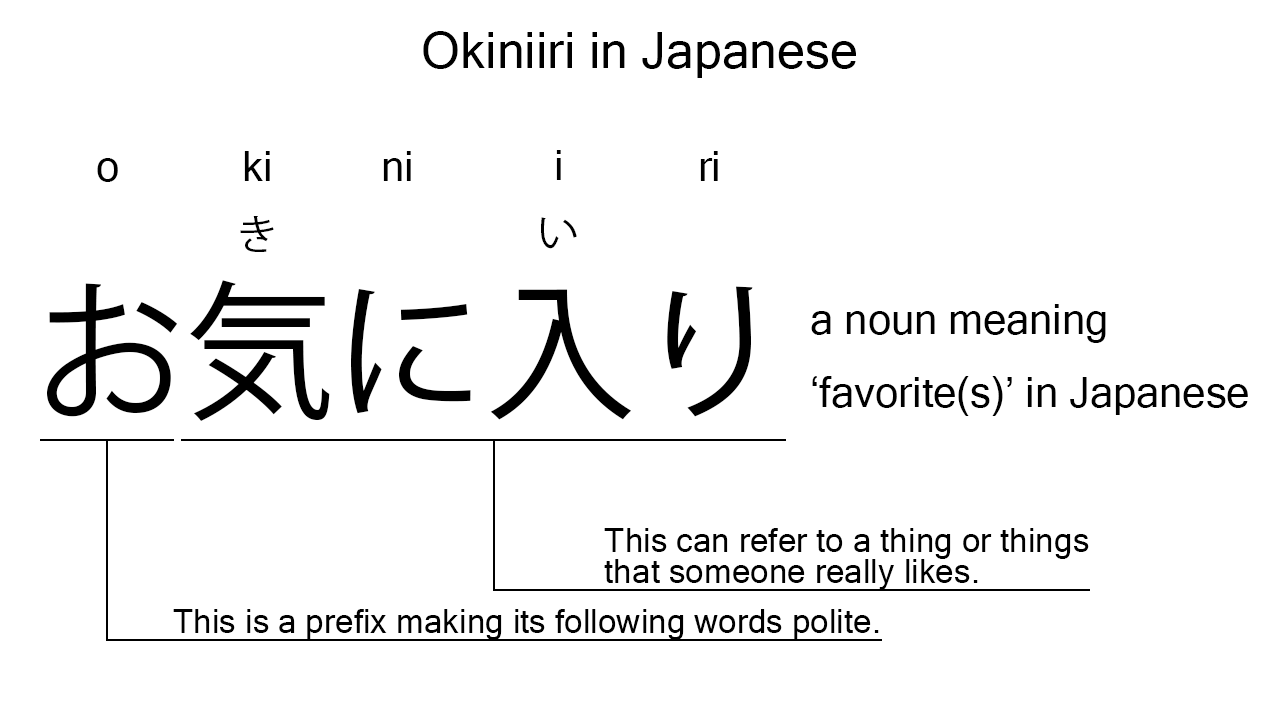What does “okiniiri” mean in Japanese?
Native speakers say “okiniiri” to mean ‘favorite’ in Japanese. Perhaps, some Japanese learners know this word as it is sometimes used in Japanese movies, songs, novels, manga, anime, and the like. In this blog post, however, I will explain this word in detail based on its grammatical components. And also, I will explain how to use it through example sentences. My explanations would help Japanese learners understand “okiniiri” more clearly. Then, let’s get started!
Contents
Definition and meaning of “okiniiri”
Let me start with the definition and meaning of “okiniiri”.
- okiniiri – お気に入り (おきにいり) : a noun meaning ‘favorite’ in Japanese. This can also work as plural. Learn more about Japanese plural.
Japanese native speakers use this noun to refer to a thing or things they really like. So, its usage is very similar to that of the English noun, “favorite”, I think.
The definition and meaning are simple and clear. To understand this noun more clearly, however, let me explain its grammatical components in detail, one by one.
What does “okiniiri” literally means in Japanese?
“Okiniiri” consists of the following two components:
- o – お : a prefix making its following words polite.
- kiniiri – 気に入り (きにいり) : the noun form of the verb, “kiniiru”, which means ‘to get to like’ or such in Japanese. This can refer to a thing or things that someone really likes.
From these two components, we can understand that “okiniiri” is literally the polite expression of “kiniiri” and therefore can politely refer to a thing or things which someone really likes.

When we meet new Japanese words, we should check their grammatical components in detail to understand their meanings clearly and deeply. In many cases, grammatical components tell us a lot about the meanings of the words they form. Actually, here, we could get the better understanding of “okiniiri” through the detailed check above.
So far, I’ve explained the definition and meaning of “okiniiri” together with its grammatical components. Then, let me explain how to use it through the example sentences below.
Example #1: how to say “my favorite” in Japanese
kono eiga wa boku no okiniiri desu – この映画は僕のお気に入りです (このえいがはぼくのおきにいりです)
This movie is my favorite.
Below are the new words used in the example sentence.
- kono – この : a determiner used before a noun referring to a thing close to the speaker. In the example, this is used before “eiga” to say “this movie” in Japanese.
- eiga – 映画 (えいが) : a noun meaning ‘movie’ in Japanese. This can also work as plural.
- wa – は : a binding particle working as a case marker or topic marker. In the example, this works after “kono eiga” to make the subject in the sentence.
- boku – 僕 (ぼく) : a pronoun meaning ‘I’ in Japanese. This is used mainly by boys and young males.
- no – の : a case particle used after a noun or pronoun to make its possessive case. In the example, this is used after “boku” to make its possessive case, “boku no”, which means ‘my’ in Japanese.
- desu – です : an auxiliary verb used after a noun or adjective to make it polite. Probably, this is well known as a part of Japanese desu form. In the example, this is used after the noun phrase, “boku no okiniiri”, to make it sound polite.
This is a typical usage of “okiniiri”. In this example, it works as a part of the noun phrase, “boku no okiniiri”, which means ‘my favorite’ in Japanese.
Example #2: another usage of “okiniiri”
kanojo no okiniiri wa nan desu ka – 彼女のお気に入りは何ですか (かのじょのおきにいりはなんですか)
What is her favorite?
Below are the new words used in the example sentence.
- kanojo – 彼女 (かのじょ) : a pronoun meaning ‘she’ in Japanese. In the example, this works together with the case particle, “no”, to say “her”.
- nan – 何 (なん) : an interrogative pronoun meaning ‘what’ in Japanese.
- ka – か : a sentence-ending particle used to make a question. This is often used with the pitch raised. As the definition suggests, this is used at the end of the example sentence to make the question.
This is another typical usage of “okiniiri”. In this example, it works as a part of the noun phrase, “kanojo no okiniiri”, which means ‘her favorite’ in Japanese. When we want to say “favorite” in Japanese, anyway, this noun is always a very good option.
Summary
In this blog post, I’ve explained the definition and meaning of “okiniiri” in detail based on its grammatical components. And also, I’ve explained how to use it through the example sentences. Let me summarize them as follows.
- okiniiri – お気に入り (おきにいり) : a noun meaning ‘favorite’ in Japanese. This can also work as plural. This is literally the polite expression of “kiniiri” and therefore can politely refer to a thing or things which someone really likes. Indeed, Japanese native speakers use this noun to refer to a thing or things they really like. So, the usage is very similar to that of the English noun, “favorite”, I think.
Hope my explanations are understandable and helpful for Japanese learners.